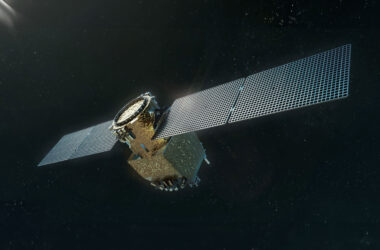The UK Space Agency has announced £3.5 million in funding for projects aiming to prolong satellite lifespan and ensure the sustainability of space operations long-term.
The funding package includes a £2 million upgrade to the Satellite Applications Catapult’s In-Orbit Servicing and Manufacturing (IOSM) facility at the Westcott Space Cluster. This facility will enable UK companies to verify, validate, and demonstrate various in-orbit activities like manufacturing, repairing, refuelling, and assembling satellites.

Above. The Satellite Applications Catapult’s In-Orbit Servicing and Manufacturing facility at the Westcott Space Cluster.
Additionally, £1.5 million was awarded to feasibility studies focused on developing the capacity to refuel satellites while in orbit – a game-changing innovation that can extend their functional lifetimes dramatically.
By investing in infrastructure and technologies that promote sustainable satellite operation instead of single-use spacecraft, the UK government aims to safeguard continued access to the space domain for future generations.
Over 37,000 pieces of tracked debris are more significant than 10cm orbiting the Earth, posing a collision risk to vital satellites and spacecraft. With the increasing number of satellites being launched yearly, space debris has become an urgent issue requiring innovative solutions.
Enhancing In-Orbit Testing Capabilities
The UK Space Agency has provided £2 million in funding for the Satellite Applications Catapult to upgrade its In-Orbit Servicing and Manufacturing (IOSM) facility at the Westcott Space Cluster.

Above. The Satellite Applications Catapult’s In-Orbit Servicing and Manufacturing facility at the Westcott Space Cluster
This facility will enable companies to test critical in-orbit operations:
- Advanced robotics and tracking equipment to simulate orbital dynamics and flight conditions
- Digital modeling capabilities to create robust virtual prototypes
- Large-scale infrastructure for manufacturing, servicing, repairs, and assembly of satellites
“IOSM is predicted to be worth £11bn globally by 2031, and the UK has the expertise to capture at least 25% of this market,” said Lucy Edge, COO of the Satellite Applications Catapult. “Our upgraded facility will help meet National Space Strategy goals and support the growth of sustainable space enterprises in the UK.”
Pioneering Satellite Refueling Solutions
Additionally, £1.5 million in government funding has been awarded to 3 feasibility studies focused on extending satellite lifespan through revolutionary in-orbit refuelling concepts:
- Astroscale will adapt its debris removal spacecraft into a modular refuelling vehicle, collaborating with major industry players like Airbus and TAS.
- ClearSpace’s “REFUEL.ME” project will build upon its flagship CLEAR debris removal mission to demonstrate refuelling commercial satellites using novel technologies.
- Orbit Fab’s “RAFTEA” mission will further develop its unique RAFTI rapid satellite refuelling interface to provide sustainable end-of-life solutions.
“Until recently, satellites had finite lifespans, eventually becoming space junk once they ran out of manoeuvring propellant,” said Ray Fielding, Head of Space Sustainability at UKSA. “These refuelling demos represent crucial steps in establishing fully sustainable and long-duration satellite constellations.”
By leading cutting-edge initiatives like these, the UK is cementing its position at the forefront of space sustainability while nurturing a thriving domestic industry. With the upgrades to the Westcott IOSM facility providing a vital breeding ground for innovation, British space enterprises are well-poised to capture significant market share as on-orbit activities like manufacturing, servicing, and refuelling ramp up globally throughout the decade. Sustainable satellite operation will benefit the environment and the economy – ensuring space remains safe and accessible for future generations.
TLDR:
- UK invests £3.5 million into sustainable space projects
- Satellite Applications Catapult facility being upgraded for in-orbit testing
- 3 companies receive funding for satellite refuelling demos
- Initiatives address the issue of rising space debris
- UK cementing leadership in sustainable satellite operations







